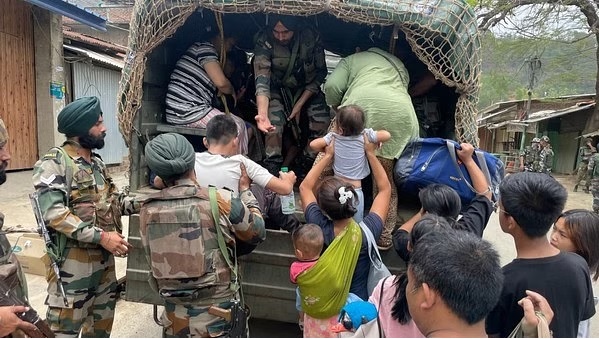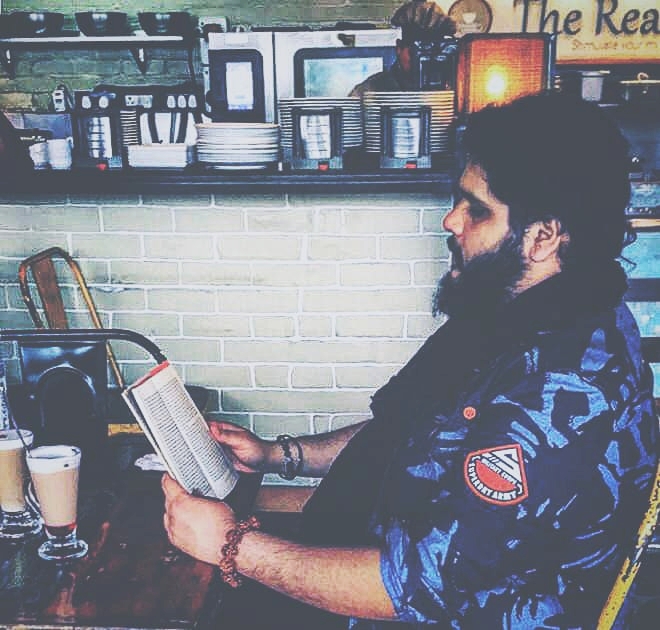While there are many facets to the crisis facing Manipur, biased media coverage and politics of convenience are only adding fuel to the fire.

When India heard that the European Union was discussing the Manipur issue, they issued a strong objection towards what they termed as ‘colonial mentality’ and retorted that such interference from the West and especially the European Union could harm the relationship India was trying to build with them. While largely, it hasn’t affected the relationship between the nations, the media be it TV, paper or even Telegram channels love to highlight dire situations than work on solving this issue. They would rather prefer to add fuel to the fire that has been kept alive for decades.
I find it extremely hilarious when people from all sides show their immaturity and blame one side or one community for this chaos. Predictable as always, the opposition demands the resignation of Biren Singh, who is portrayed as the hero of the Meitei community and has faced accusations of being anti-tribal. Whether that is true or not is for an investigation to conclude. Such accusations thrown mostly by the opposition and foreign agencies cast doubt about their intentions.
The present crisis in Manipur is not black and white by any measure. There are many complexities with allegations of state agencies including the police and the army favouring one side or the other making rounds. Journalists like Arnab Goswami and others who call for unity on this issue tend to forget that we cannot arrive at such a utopian solution through dialogue alone. The issue of Chinese arms entering Manipur via Myanmar has finally come to the forefront. A porous border where in some villages there is open access for a few kilometres to freely move will only aggravate this issue. Such details never make it to the news in foreign media that falsely show how India is killing Christians and Muslims on a large scale using its state agencies. They are interested only in pushing their fake narratives on India.
The Government also isn’t away from scrutiny. There are serious allegations over the Chief Minister’s ability to handle the situation and his questionable attitude towards the Kukis. Arrests are being made but that won’t quench the thirst of an emotional public which may or may not ever understand the reality of this situation. The government underestimated the situation and was ready for the kind of response that it received when it closed poppy plantations that are run mainly by Kuki and Naga communities. Adding to this, the High Court order for granting Schedule Tribe status to Meities resulted in protests against the order which ignited the situation that we see today.
Antecedents of the Issue
The area of Manipur is approximately 22,000 sq km where the 10% valley area is surrounded by 90% hills from all sides. Manipur is inhabited by four major groups – The Meiteis, Nagas, Kukis and Meitei Pangals. After independence, Meiteis were classified as Generals & hill people as ST. Many in the Meitei community demanded the status of ST as well.
Presently, some issues add fuel to the fire that no Western media likes to show. For if they do, their narrative will be questioned on every merit whatsoever.
1) The Kukis have poppy plantations used for the drug trade. Recently the government has been destroying poppy plantations. They are angry at the government for this. They argue it is their birthright to cultivate poppies and manufacture heroin. These aspects are alleged as many might come to deny later.
2) The poppy-growing land belongs to the government, including the hills and forests. Kukis are in Myanmar too, and because of atrocities by them on Buddhists in Myanmar and subsequent Myanmar military action, many Myanmar Kukis are illegally entering the hills of Manipur. The Manipur Kukis allegedly help the Myanmar Kukis to settle in the hills, make fake Aadhar cards and thus are becoming citizens illegally. New villages are popping up overnight. The government found out that the illegal immigrants were encroaching on the reserved forest areas and began evicting them. Consequently, the Kukis are playing the victim card and claiming the hills “belong to them”. The government’s intention to start NRC is another reason for the violent protests. Further, 90% of the hills are protected by MLR & LR Act and Article 371c as the hill people are Scheduled Tribes. No one can buy land and settle in tribal land.
According to a few Meitei sources, their population is sparse in the hills. The 10% valley land is the land of the indigenous Meiteis (having more than 2000 years of chronicled history) and where they are settled for thousands of years. But since they are part of the “general” category, everyone comes and settles for business and work buying land and permanently settling. Slowly, the Meiteis are being elbowed out and illegal Kukis are being settled there. Anyone and everyone can settle in the Meitei Valley. The Meiteis are becoming a minority in their own land. No safeguard for the indigenous Meiteis just because all are General while the same indigenous hill people the tribals get safeguarded as STs. It is because of this discrimination among the indigenous people of the same state, Meiteis are now demanding ST status to get constitutional safeguards. But the Tribals are opposing it. Hence the demand for an NRC comes from the Meiteis.
Shortcomings of the Government
The BJP government in Manipur has been sitting over the issue while recently HC Manipur directed the State govt to send recommendations to the centre to include Meiteis in the ST category. The tribals instead of appealing in SC have resorted to violent agitations. Soon after the HC verdict, thousands of Kuki youths including armed Kuki militants crossed over to the bordering valley district of Bishnupur and burned Meitei houses killing people including infants. As these protests spread, the foreign media was silent and no concern was expressed over such violent agitation.
Later as the Meitei retaliation began, the media woke up and reported how ethnic cleansing of Christians is going on in Manipur. It became a tool to attack the Indian government and by extension, the Hindus as well. The Left rejoiced at the opportunity and accused the Modi government of inaction while remaining mum when more than 700 people died in Manipur with 200 armed personnel during the UPA rule. It doesn’t suit both the government and the opposition to only blame each other and not take responsibility for their shortcomings in the state of Manipur. The shortcomings on the government’s part have allowed the foreign media to further divide the Manipuri society and have allowed the militant groups in Myanmar to maximize their goals and continue to bleed Manipur for more than 77 days now.
Biased Media Coverage
Western media, paper, digital or telegram channels like Global Intel and Bellum Acta as well as Pakistan’s IROP wept crocodile tears and asked Christian nations to interfere in the Manipur crisis. They complained that the Indian government asked Twitter and Facebook to not publish the videos from Manipur. The Government argues that it is for stopping the hatred online and to calm passions and anger in this ethnic clash. However, the government’s lack of communication allowed the foreign media to take control of the narrative.
I have no sympathy for those who paraded the two Kuki women in an inhuman manner. The law must take its course. But the biased foreign media coverage which ignored the crimes of the Kuki groups and ignored the travails of the Meitei people who had to leave their homes and live in temporary camps must be called out.
It is funny when the Western liberal system even thinks that Protestants, Catholics, Eastern Orthodox, Mormons and Freemasons will care for a few converts in Manipur when they don’t care about the deaths and oppression of Christians in Ukraine, Armenia, Iraq, Latin America, Eastern Europe, Serbia, Haiti, Nigeria and Africa etc. Let alone the fake tears, they removed Nigeria from a list of dangerous places for minorities despite more than a thousand Christians dying there. They fail to take into account the number of Christians dying in Iraq, Syria, and Armenia but will lecture you on Manipur because of their investment as well as their lack of control over the Burmese internal strife. Yet they open their eyes to an attempted Christian – Muslim bonhomie to target Bharat. It’s for those in Manipur to realise that fake tears that the outside press sheds for you are not for your welfare but to milk that situation for themselves.
This is yet another example of their attempt to try and interfere and interfere. The less I say for Pakistan the better. If you can justify Hindus getting slaughtered in your land and ignore their plight, their crocodile tears are as laughable as a comedy show featuring any comedian.
What can the government do?
The Government cannot resort to violent counter-measures as the situation is way more complicated. Their lack of communication helps vested interests prolong the crisis which works to their advantage. In order to resolve the crisis, the government must monitor the kind of immigrants from Myanmar and those who are destabilizing the border areas. The Indian Army has led major rescue operations and more than 23,000 people have been relocated. (~10,000 from the Kuki community and ~9500 from Meitei and the rest from other communities). This shows the impartiality with which the Indian Defence Forces are carrying out rescue operations. The foreign media and governments have conveniently ignored this fact as it does not serve their interests. The Indian government’s sharp response to them was apt.
However, the government has its task cut out to arrive at a solution. Giving into a separate state demand will increase the insurgency to volatile levels that we have never witnessed before. The Government on its part needs to stop pandering to pressure tactics and underestimating the fallout of the crisis as well.
(Anhad Jakhmola is a postgraduate scholar in international relations. He has his undergraduate degree in history and is pursuing his PhD in Defence and Strategic Studies. He is a columnist for many portals and is a keen public speaker in debates and discussions. Views expressed are author’s own)

